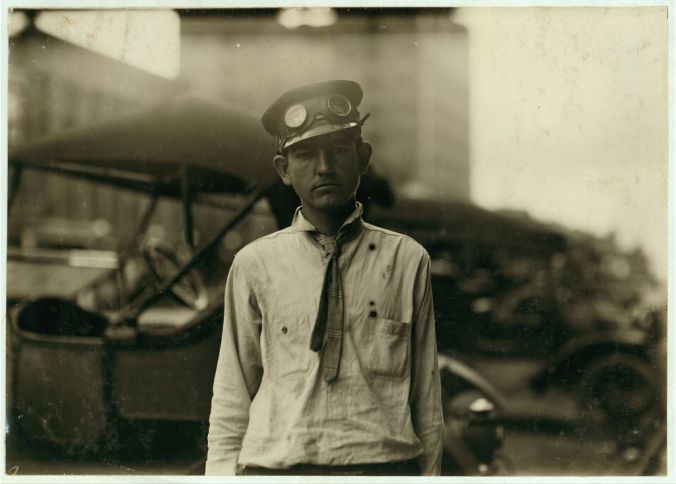A factories inspector named Jean Gordon was quoted in a 1908 New Orleans newspaper in which she decried the “absolutely unblushing manner in which mothers declare their children of legal age argues poorly for their moral training.“ She added darkly, “Not for one moment do I wish this community to think I have been deceived by the statements of either parents or manufacturers.”
As quaint as this scolding sounds, Ms. Gordon had identified a real problem. Lewis Wickes Hine spent quite a bit of time talking to and photographing the messenger boys because he could also see these young boys were often put into roles by a struggling parent who needed the money to feed their household. Often this meant dropping out of school at a very early age.
Whether these mothers and fathers understood the situations in which their children would inevitably be exposed to is unknown.
These are a few stories about the messenger boys who were overwhelmed by–and eventually became part of–their seedy environment.

Durward Nickerson
Durward Nickerson, Western Union messenger #55. Birmingham, Alabama. September, 1914. “He took investigator through the old Red Light on Ave. A, pointed out the various resorts, told him about the inmates he has known there,” the notes read. “Only a half dozen of them were open now, and those very quietly. Durward has put in 2 years in the messenger work and shows the result of temptations open to him. He has recently returned from a hobo trip through 25 states. He was not inclined to tell much about the shady side of messenger work, but one could easily see that he has been through much that he might have avoided in a profitable kind of work. 18 years old.” Hine wryly labeled this photo: “One of the by-products of messenger work.”

Willie Cheatham
Willie Cheatham was Western Union messenger #1 in Montgomery, Alabama. 1914 October.
“Says he is 16 years now; been messenger for 6 years. Late Sunday night, October 4th, I talked with him, still on duty, until 10 P.M. ‘You bet I know every crooked house in town. Went to school with one of those girls when she was straight. Her mother died and she went bad. Some young girls were there too. I go out to Red Light some with messages and packages, and if I want to, I bust right in and sit down.'”
Hine added an afterthought, “Hard face.”

Eugene Dalton
Eugene Dalton, Fort Worth, Texas.. “For nine years, this 16-year-old boy has been newsboy and messenger for drug stores and telegraph companies,” Hine wrote in 1913. “He was recently brought before the Judge of the Juvenile Court for incorrigibility at home. Is now out on parole, and was working again for drug company when he got a job carrying grips in the Union Depot. He is on the job from 6 A.M. to 11 P.M. (17 hours a day) for seven days in the week. His mother and the Judge thinks he uses cocaine, and yet they let him put in these long hours every day. He told me, ‘There ain’t a house in the Acre, (Fort Worth’s Red Light district) that I ain’t been in. At the drug store, all my deliveries were down there.’ Dalton made $15-$18 a week.”

John Towers
Hine’s notes: “John Towers, 1910 May. Postal Telegraph Company, Messenger # 9. 15 years of age. In service 1 year. Visits houses of prostitution. Sometimes smokes. Wilmington, Delaware.”
Note: All photos courtesy of Library of Congress.
Sad to think of those young boys having to quit school and go to work. It was a different time back then. Your stories are always interesting!
LikeLiked by 1 person
Thank you so much! I wonder what became of them…
LikeLike